

Imágenes de Google. 47 U.S. Code § 230 - Protection for private blocking and screening of offensive material. Ex.

Ord. No. 13925. Preventing Online Censorship Ex. Ord. Section 230 protections. Section 230 protections. Offline population has declined substantially since 2000. Seven-in-ten Facebook users say they visit site daily. An Overview of Internet Addiction. Internet addiction is a behavioral addiction in which a person becomes dependent on use of the Internet, or other online devices, as a maladaptive way of coping with life's stresses.
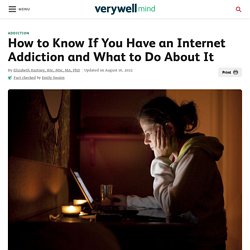
Internet addiction is becoming widely recognized and acknowledged, particularly in countries where it is affecting large numbers of people, such as South Korea, where it has been declared a national health problem.1 Much of the current research on the subject of Internet addiction has been carried out in Asia. It is also a growing concern in developed nations in North America and Europe. Top 5 Things to Know About Internet Addiction Internet addiction is not yet an officially recognized mental disorder. 1. The innovations these experts predict by 2030. Americans and many around the world are not terribly satisfied with the state of democracy and the institutions that undergird it.
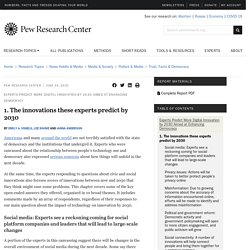
Experts who were canvassed about the relationship between people’s technology use and democracy also expressed serious concerns about how things will unfold in the next decade. At the same time, the experts responding to questions about civic and social innovations also foresee scores of innovations between now and 2030 that they think might ease some problems. This chapter covers some of the key open-ended answers they offered, organized in 10 broad themes. It includes comments made by an array of respondents, regardless of their responses to our main question about the impact of technology on innovation by 2030. 5. Leading concerns about the future of digital life. The comments in the following section are a sharp contrast to the utopian visions of equity and advancement described above.
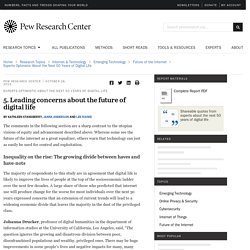
Whereas some see the future of the internet as a great equalizer, others warn that technology can just as easily be used for control and exploitation. Inequality on the rise: The growing divide between haves and have-nots The majority of respondents to this study are in agreement that digital life is likely to improve the lives of people at the top of the socioeconomic ladder over the next few decades. A large share of those who predicted that internet use will produce change for the worse for most individuals over the next 50 years expressed concerns that an extension of current trends will lead to a widening economic divide that leaves the majority in the dust of the privileged class.
Jillian C. - The Washington Post. - The Washington Post. Here’s How Facebook Decides What You Can and Can’t Post. Facebook has updated the policies that govern what users can and can’t post on the social network.
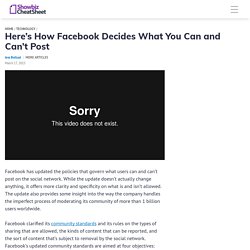
While the update doesn’t actually change anything, it offers more clarity and specificity on what is and isn’t allowed. The update also provides some insight into the way the company handles the imperfect process of moderating its community of more than 1 billion users worldwide. AP Exclusive: Google tracks your movements, like it or not. EJSpring11 Full. Addressing the Question of Disorder-Specific Risk Factors of Internet Addiction: A Comparison of Personality Traits in Patients with Addictive Behaviors and Comorbid Internet Addiction. Uncontrolled use of the internet has been reported to affect the lives of some users in a negative way.
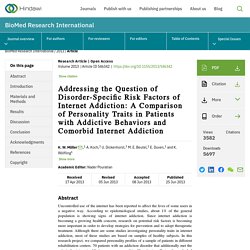
According to epidemiological studies, about 1% of the general population is showing signs of internet addiction. Since internet addiction is becoming a growing health concern, research on potential risk factors is becoming more important in order to develop strategies for prevention and to adopt therapeutic treatment. 31% of American adults are online almost constantly. As smartphones and other internet-connected devices have become more widespread, 31% of U.S. adults now report that they go online “almost constantly,” up from 21% in 2015, according to a new Pew Research Center survey conducted Jan. 25 to Feb. 8, 2021.
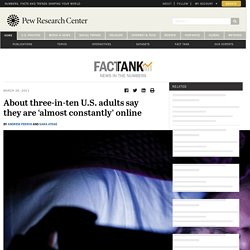
Overall, 85% of Americans say they go online on a daily basis. That figure includes the 31% who report going online almost constantly, as well as 48% who say they go online several times a day and 6% who go online about once a day. Some 8% go online several times a week or less often, while 7% of adults say they do not use the internet at all. Pew Research Center has a history of studying internet usage. Smartphone usage statistics 2020. Do discussions in like-minded groups necessarily lead to more extreme opinions? Deliberative democracy and group polarization - Kim Strandberg, Staffan Himmelroos, Kimmo Grönlund, 2019. Introduction Many Western democracies are currently affected by a negative, and even aggressive, discussion climate.

According to Sunstein (2002, 2009), opinion polarization, in the sense of opinions becoming more extreme through discussion than they initially were, is a consequence of the fact that most people tend to discuss politics among like-minded individuals, nowadays often in online contexts. Science vs Conspiracy: Collective Narratives in the Age of Misinformation. Abstract The large availability of user provided contents on online social media facilitates people aggregation around shared beliefs, interests, worldviews and narratives.

In spite of the enthusiastic rhetoric about the so called collective intelligence unsubstantiated rumors and conspiracy theories—e.g., chemtrails, reptilians or the Illuminati—are pervasive in online social networks (OSN). In this work we study, on a sample of 1.2 million of individuals, how information related to very distinct narratives—i.e. main stream scientific and conspiracy news—are consumed and shape communities on Facebook.
Demographics of Internet and Home Broadband Usage in the United States. The internet represents a fundamental shift in how Americans connect with one another, gather information and conduct their day-to-day lives.
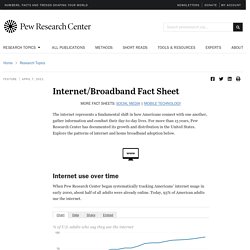
For more than 15 years, Pew Research Center has documented its growth and distribution in the United States. Explore the patterns of internet and home broadband adoption below. Internet use over time When Pew Research Center began systematically tracking Americans’ internet usage in early 2000, about half of all adults were already online. Advanced Advertising on Amazon. EdgeRank. 15 of the Most Important Algorithms That Helped Define Mathematics, Computing, and Physics. Algorithms are used by all of us all the time with or without our direct knowledge.
They have applications in many different disciplines, from math and physics to, of course, computing. It turns out algorithms have a long and illustrious history stretching back as far as ancient Mesopotamian times. But which of these complex calculation processes could be considered some of the most important? These are 15 of the most likely candidates. 6 Ways Social Media Affects Our Mental Health. Health experts love to say that sitting is the new smoking. Given the number of diseases to which sitting is linked, and the number of people it apparently kills every year, sitting is one of the worst things we can do for health. But possibly as concerning is the thing that we often do while we're sitting: Mindlessly scrolling through our social media feeds when we have a few spare minutes (or for some, hours). And as we probably know intuitively, and as the research is confirming, it's not the best habit when it comes to our collective psychology.
Social Media: The Good, The Bad, and The Ugly. How Section 230 reform endangers internet free speech. Everywhere one looks in Washington one finds proposals to reform Section 230 of the Communications Decency Act, which grants internet platforms legal immunity for most of the content posted by their users. Former Vice President Joe Biden wants to repeal it and even has an ally of sorts in President Donald Trump, who is using threats to explode Section 230 against his perceived enemies in Silicon Valley. One congressional proposal would condition immunity on an impossible standard of neutral content moderation. Another would condition immunity on undermining encryption. Some of these proposals are not intended to become law. Why A Big Government Cure Would Be Worse Than Big Tech Control.
September could end with a bang for Big Tech companies facing allegations of unfair business practices. Apple will meet Epic Games on Sept. 28 in federal court to explain the App Store erasure of the Fortnite video game. Then regulatory hearings will resume on Sept. 30 in Washington, D.C., following testimony from Apple, Amazon, Facebook and Google executives in late July. Meanwhile, the U.S. Department of Justice could file antitrust charges against Google as early as this week. All three storylines involve fears that a small handful of gatekeepers have taken over the “information superhighway” and turned it into a private toll road. Big Tech, Out-of-Control Capitalism and the End of Civilization. My girlfriend, “Emily,” is always telling me I have to read this or watch that. I usually resist. I have my own obsessions to indulge, like quantum mechanics.
Big Tech has big power over online speech. Should it be reined in? Interactivity & Mobile Development. Key Internet Statistics to Know in 2021 (Including Mobile) - BroadbandSearch. The rise of social media. What is an algorithm? An ‘in a nutshell’ explanation - ThinkAutomation. Facebook and Google as Offices of Censorship. 25 1984 Quotes That Are Way Too Real. Web.b.ebscohost. Web.b.ebscohost. Web.b.ebscohost. Www.proquest.